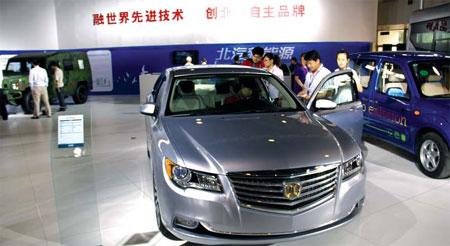Beijing Automotive introduces new vehicle
Updated: 2012-02-13 13:22
By Han Tianyang (China Daily)
|
|||||||||||
BEIJING - In the midst of stiffer competition that placed Chinese homegrown cars in a tight spot, Beijing Automotive Group (BAIC Group) announced it would launch its first own-brand car next month.
|
 |
|
Beijing brand car on display at local exhibition in 2010. The model was expected to enter the market last year but struggled with a delay due to a longer than anticipated process over obtaining government approval. [Photo/China Daily] |
The compact hatchback with the nameplate "Beijing", was expected to hit the market last year but struggled with a delay due to a longer than anticipated process over obtaining government approval.
With the green light from regulators, the automaker, based in the capital city, can sell its cars this year: first a low-priced five-door model in March with engine options of 1.3 and 1.5 liters, and later a medium-sized sedan coming in the latter half the year.
The fifth-largest auto group in China will open approximately 80 nationwide dealerships for the Beijing vehicles by the end of the year along with a separate sales network of 100 shops for Weiwang minivans that were launched a year ago.
Combined sales of Beijing cars and Weiwang minivans are expected to reach 100,000 units this year, the company said.
"The biggest challenge is winning over consumer confidence in regards to homegrown brands," said Dong Haiyang, vice-president of BAIC Motor, a subsidy of the group set up for a planned stock listing.
About 2.9 million domestic-brand cars (excluding minivans) were sold last year, less than a third of the total market volume, according to the China Association of Automobile Manufacturers.
Its market share had dropped by 1.78 percentage points compared with a year earlier as a result of fiercer competition from foreign-brand rivals and the expiration of tax incentives for small cars - a segment that most domestic automakers compete in.
Before the Weiwang minivan hit the market in March last year, BAIC Group did not produce self-developed passenger vehicles and the majority of its earnings were contributed by its partnerships with the German luxury carmaker Mercedes-Benz and Hyundai Motors of South Korea.
With 1.54 million vehicles sold last year, revenues increased 27 percent to 201 billion yuan and net profits surged 46 percent to 15.8 billion yuan. More than 80 percent of profits originated from its joint ventures.
The group announced a target to achieve a modest increase of 8 percent in net profits this year that indicates a determination to invest heavily in the development of homemade vehicles.
The company seeks to sell 1.8 million vehicles this year, up 17 percent from the previous year with targets of a 14 percent increase in revenues to 230 billion yuan and net profits of 17 billion yuan.
Related Stories
Chinese car brands hit bumps in Singapore 2011-08-12 13:45
50 million cars a year by 2021: DRC 2011-07-11 09:25
Chinese cars invade Saudi Arabia market 2011-10-18 15:54
Nepali market for Chinese cars growing slowly 2011-08-23 13:22
Domestic cars the stars at auto expo 2011-07-20 10:38
- Stores pulling Red Bull on health fears
- Mini SLRs set to snap up the photo market
- China working hard to lure foreign experts
- Wen: Giant State firms need private investment
- Direct purchase plans bring in more profits
- US short-sellers muddy the waters
- Domestic auto sector makes big impact
- Hainan mulls tax on vacant homes








